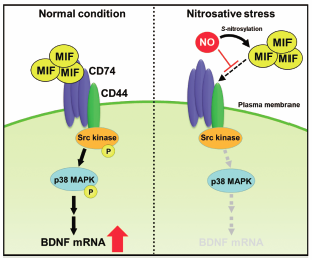2 0 0 0 OA Attenuation of Macrophage Migration Inhibitory Factor-Stimulated Signaling via S-Nitrosylation
- 著者
- Kengo Nakahara Kana Fujikawa Hideki Hiraoka Ikuko Miyazaki Masato Asanuma Akihiro Ito Nobumasa Takasugi Takashi Uehara
- 出版者
- The Pharmaceutical Society of Japan
- 雑誌
- Biological and Pharmaceutical Bulletin (ISSN:09186158)
- 巻号頁・発行日
- vol.42, no.6, pp.1044-1047, 2019-06-01 (Released:2019-06-01)
- 参考文献数
- 28
- 被引用文献数
- 12
Nitric oxide (NO) is a key signaling molecule that has various effects via S-nitrosylation, a reversible post-translational modification that affects the enzymatic activity, localization, and metabolism of target proteins. As chronic nitrosative stress correlates with neurodegeneration, the targets have received focused attention. Macrophage migration inhibitory factor (MIF) plays a pivotal role in the induction of gene expression to control inflammatory responses. MIF acts as a ligand for CD74 receptor and activates the Src-p38 mitogen-activated protein kinase (MAPK) cascade. MIF also elevates the expression of brain-derived neurotrophic factor (BDNF), which contributes to the viability of neurons. Here, we show that MIF is S-nitrosylated by a physiological NO donor. Interestingly, the induction of S-nitrosylation resulted in a loss of MIF activity following stimulation of the Src and p38 MAPK signaling pathways and the induction of BDNF expression. Our results shed light on the pathogenic mechanisms of neurodegenerative diseases, such as Alzheimer’s disease and Parkinson’s disease.
1 0 0 0 OA L-Theanine protects against excess dopamine-induced neurotoxicity in the presence of astrocytes
- 著者
- Mika Takeshima Ikuko Miyazaki Shinki Murakami Taizo Kita Masato Asanuma
- 出版者
- SOCIETY FOR FREE RADICAL RESEARCH JAPAN
- 雑誌
- Journal of Clinical Biochemistry and Nutrition (ISSN:09120009)
- 巻号頁・発行日
- vol.59, no.2, pp.93-99, 2016 (Released:2016-09-01)
- 参考文献数
- 40
- 被引用文献数
- 15 22
l-Theanine (γ-glutamylethylamide), a component of green tea, is considered to have regulatory and neuroprotective roles in the brain. The present study was designed to determine the effect of l-theanine on excess dopamine-induced neurotoxicity in both cell culture and animal experiments. The primary cultured mesencephalic neurons or co-cultures of mesencephalic neurons and striatal astrocytes were pretreated with l-theanine for 72 h, and then treated with excess dopamine for further 24 h. The cell viability of dopamine neurons and levels of glutathione were evaluated. Excess dopamine-induced neurotoxicity was significantly attenuated by 72 h preincubation with l-theanine in neuron-astrocyte co-cultures but not in neuron-rich cultures. Exposure to l-theanine increased the levels of glutathione in both astrocytes and glial conditioned medium. The glial conditioned medium from l-theanine-pretreated striatal astrocytes attenuated dopamine-induced neurotoxicity and quinoprotein formation in mesencephalic neurons. In addition, replacement of l-glutamate with l-theanine in an in vitro cell-free glutathione-synthesis system produced glutathione-like thiol compounds. Furthermore, l-theanine administration (4 mg/kg, p.o.) for 14 days significantly increased glutathione levels in the striatum of mice. The results suggest that l-theanine provides neuroprotection against oxidative stress-induced neuronal damage by humoral molecules released from astrocytes, probably including glutathione.
1 0 0 0 OA L-Theanine protects against excess dopamine-induced neurotoxicity in the presence of astrocytes
- 著者
- Mika Takeshima Ikuko Miyazaki Shinki Murakami Taizo Kita Masato Asanuma
- 出版者
- SOCIETY FOR FREE RADICAL RESEARCH JAPAN
- 雑誌
- Journal of Clinical Biochemistry and Nutrition (ISSN:09120009)
- 巻号頁・発行日
- pp.16-15, (Released:2016-07-16)
- 参考文献数
- 40
- 被引用文献数
- 8 22
l-Theanine (γ-glutamylethylamide), a component of green tea, is considered to have regulatory and neuroprotective roles in the brain. The present study was designed to determine the effect of l-theanine on excess dopamine-induced neurotoxicity in both cell culture and animal experiments. The primary cultured mesencephalic neurons or co-cultures of mesencephalic neurons and striatal astrocytes were pretreated with l-theanine for 72 h, and then treated with excess dopamine for further 24 h. The cell viability of dopamine neurons and levels of glutathione were evaluated. Excess dopamine-induced neurotoxicity was significantly attenuated by 72 h preincubation with l-theanine in neuron-astrocyte co-cultures but not in neuron-rich cultures. Exposure to l-theanine increased the levels of glutathione in both astrocytes and glial conditioned medium. The glial conditioned medium from l-theanine-pretreated striatal astrocytes attenuated dopamine-induced neurotoxicity and quinoprotein formation in mesencephalic neurons. In addition, replacement of l-glutamate with l-theanine in an in vitro cell-free glutathione-synthesis system produced glutathione-like thiol compounds. Furthermore, l-theanine administration (4 mg/kg, p.o.) for 14 days significantly increased glutathione levels in the striatum of mice. The results suggest that l-theanine provides neuroprotection against oxidative stress-induced neuronal damage by humoral molecules released from astrocytes, probably including glutathione.
